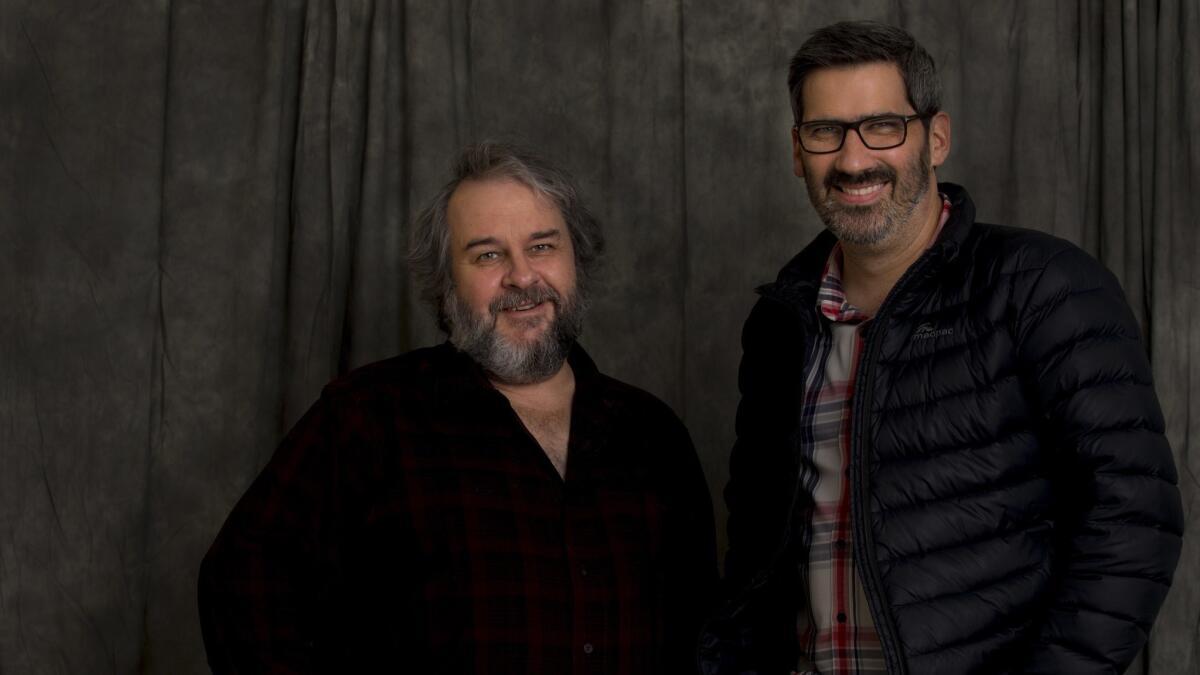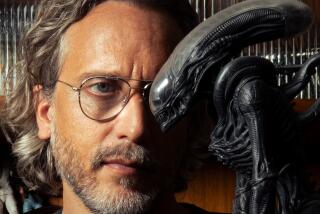How Peter Jackson and his protégé Christian Rivers revved up ‘Mortal Engines’ for the big screen

- Share via
In 2015, Peter Jackson was feeling burned out — and you could hardly blame him. The New Zealand director had just finished work on the “Hobbit” films, wrapping up production on his supersized fantasy trilogy in a final sprint of 22-hour days that had left his energy depleted and his brain utterly fried.
For several years, Jackson had been developing another big-budget fantasy film, “Mortal Engines,” a post-apocalyptic epic based on a series of young-adult novels by British author Philip Reeve. But as much as he loved the project — set in a future in which mechanized steampunk cities rove a world ravaged by war in search of resources — at that point he just didn’t have enough oomph in his own engine to take on another ambitious piece of cinematic world-building.
“ ‘Mortal Engines’ was fun and exciting and it didn’t have any superheroes in it, which is for me a big appeal,” the director said on an early October afternoon during a visit to Los Angeles. “But I was exhausted. I just wanted a bit of time off, to tell the truth.”
So Jackson turned to a younger protégé, a storyboard artist, visual effects supervisor and second-unit director named Christian Rivers with whom he’d worked for more than 20 years, going back to the 1992 slapstick horror film “Braindead.”
Never mind that the fellow New Zealander had never directed any feature, let alone an enormously complicated and costly tentpole. How would Rivers like to take on “Mortal Engines”?
“The idea was utterly terrifying,” Rivers recalled. “I was in the middle of working with an independent producer in Wellington to do my first low-budget feature, which is usually the sensible way to do these things. But I want to direct films – and if I’m going to be offered something like this and turn it down, then I shouldn’t be directing.”
Three years later — and more than a decade after Jackson began developing the project — “Mortal Engines” is reaching theaters this weekend, boasting plenty of visual razzle-dazzle but without the massive built-in brand awareness of competitors like “Spider-Man: Into the Spider-Verse,” “Mary Poppins Returns” and “Bumblebee.” Though reviews have been decidedly mixed (Times critic Kenneth Turan deemed it “half wonderful and half monotonous”), the film’s backers hope it can hold its own in a crowded movie marketplace and, if all goes well, spawn an ongoing series.
Set hundreds of years after a cataclysmic “Sixty Minute War” has wiped out civilization as we know it, “Mortal Engines” centers on a fierce young woman named Hester Shaw (Hera Hilmar), who teams up with an apprentice historian named Tom Natsworthy (Robert Sheehan) as she pursues vengeance against a power-hungry leader (Hugo Weaving) who killed her mother.
Though the “Mortal Engines” books have a devoted fan base, they are still largely unfamiliar to many potential moviegoers. So in pitching the project to executives at Universal Pictures, Rivers, 44, and Jackson, 57, highlighted those strands of storytelling DNA it shares with better-known properties.
“We kind of had a triangle, which was that if you had ‘Star Wars,’ ‘Mad Max’ and ‘Harry Potter’ — obviously without the Force and magic — we would try to land somewhere in the middle of those three,” Rivers said. “You have the scale of ‘Star Wars,’ the character of the ‘Harry Potter’ world but also the adrenaline of the ‘Mad Max’ movies.”
Still, as compelling as that idea may have sounded, with a first-time filmmaker and no major stars on board, the fact that Universal was willing to gamble on “Mortal Engines” was ultimately a testament to Jackson’s clout as a director whose films, including the “Lord of the Rings” trilogy, have grossed well over $6 billion worldwide and who made the 2005 hit “King Kong” at the studio.
In a way, “Mortal Engines” encapsulates some of the dilemmas that today’s studios face in attempting to break out of the endless cycle of sequels and reboots and generate fresh franchises, maintaining relationships with powerhouse directors like Jackson while nurturing emerging talents like Rivers.
“It terrifies the studio,” Jackson, who co-wrote and produced the film with longtime collaborators Fran Walsh and Philippa Boyens, said flatly. “The studio does have a problem, I can see. They’re very good, but you can see they’re slightly out of their comfort zone suddenly having to launch a $100 million-plus movie that isn’t an existing franchise.”
“Deep down in their hearts, they want something new,” said Rivers, who shared an Oscar for visual effects for his work on “King Kong” and did second-unit directing on “The Hobbit” as well as Disney’s 2016 family film “Pete’s Dragon.” “But they don’t know how to create the new thing, and the risks that you have to take to create it — there’s a weird disconnect that happens. At some point you sort of have to trust that the film is going to do its job and the audience will want something new.”
In adapting “Mortal Engines” for the big screen, certain alterations were made. The steampunk aesthetic was modernized to some degree, and the characters of Hester and Tom, who are teenagers in the books, were shifted into their 20s. But Boyens said that, as with the “Lord of the Rings” and “Hobbit” adaptations — which deviated from J.R.R. Tolkien’s source material in a number of ways – those changes were made with great care and consideration.
“The books do have a really passionate fan base, and you always have to be aware of that,” said Boyens. “I always feel a little bit trepidatious when you hear that one of your favorite books is going to be made into a movie. But I think that so long as the spirit of the book is there, if you can fall into that world, you forget that it’s not slavishly copying the book. And my interaction with fans has been that they understand that.”
For Rivers, taking on a project on the scale of “Mortal Engines” was daunting to the say the least. But Jackson — who met Rivers after the then-high schooler sent the director a fan letter accompanied by impressive drawings of dragons and monsters — found the idea of helping his protégé step onto a larger stage satisfying.
“The whole point of working with a new director is you get to a point where you have a reasonable amount of experience and you want to pass that experience on,” said Jackson. “Otherwise, what’s the point of having it? You get a few gray hairs, and you start to think it would be nice to help someone else out.”
Handing off the directing reins on “Mortal Engines” also allowed Jackson to dive into another passion project, the well-received World War I documentary “They Shall Not Grow Old,” which is being released in select theaters as a special Fathom event on Monday and Dec. 27.
Whenever Rivers felt overwhelmed by the magnitude of “Mortal Engines,” knowing he could turn to the man who had successfully brought Middle-earth to life on screen proved a tremendous comfort.
“It’s been a collaboration,” Rivers said. “It’s not like they tossed me the keys to the Ferrari and said, ‘Go for a spin.’ Pete very much guided me through the whole process.”
“The fact is, any film is terrifying,” Jackson said. “You’re scared you’re making a piece of crap, and that drives you to make sure you don’t end up with a product that’s all your worst fears. Fear is a vital motivating tool. Whether it’s a director or a writer or a producer, you’ve got to be scared.
“Ultimately the best thing you can do is make a good film,” he continued. “The one thing you can do to help your odds of it being successful is to just make the best possible film you can. Too bad the books aren’t as famous as ‘The Hunger Games.’ Too bad no one knows the actors. Just make a good film.”
Twitter: @joshrottenberg
More to Read
Only good movies
Get the Indie Focus newsletter, Mark Olsen's weekly guide to the world of cinema.
You may occasionally receive promotional content from the Los Angeles Times.











